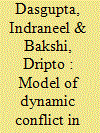| Srl | Item |
| 1 |
ID:
175313


|
|
|
|
|
| Summary/Abstract |
We model simultaneous inter and within identity-group conflict in two territories connected by cross-territorial spillovers. Within each territory, two groups contest the division of a group-specific public good, and all members contest the division of group income. Each group has a cross-border affiliate. Greater success (share) of its affiliate ‘spills over’ into higher efficiency of a group in inter-group conflict. We find that inter-group and total conflict move together within a territory, while within-group conflict and output move in the opposite direction. A unilateral increase in cross-border spillover reduces inter-group conflict in the source territory but increases it in the destination; an equi-proportionate bilateral increase affects conflict in a non-monotone manner. Population increase in a territory, a larger minority, weaker property rights, higher relative labour productivity of the majority, may all increase inter-group conflict in the other territory. Community-neutral growth in labour productivity within a territory reduces inter-group conflict therein.
|
|
|
|
|
|
|
|
|
|
|
|
|
|
|
|
| 2 |
ID:
157831


|
|
|
|
|
| Summary/Abstract |
We model an infinitely repeated Tullock contest, over the sharing of some given resource, between two ethnic groups. The resource is allocated by a composite state institution according to relative ethnic control; hence the ethnic groups contest the extent of institutional ethnic bias. The contest yields the per-period relative influence over institutions, which partly spills over into the next period, by affecting relative conflict efficiency. Our model generates non-monotone evolution of both conflict and distribution. Results suggest that external interventions, when effective in reducing current conflict and protecting weaker groups, may end up sowing the seeds of greater future conflict.
|
|
|
|
|
|
|
|
|
|
|
|
|
|
|
|